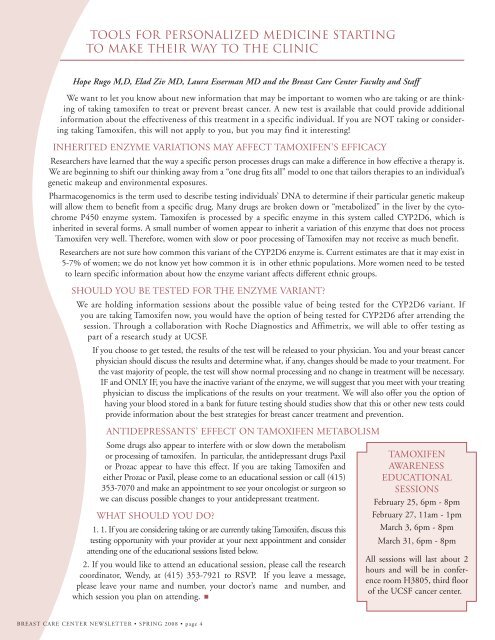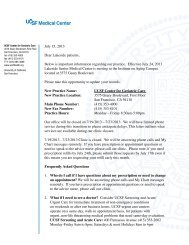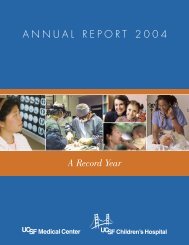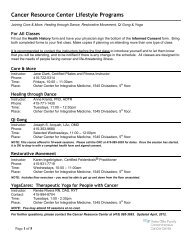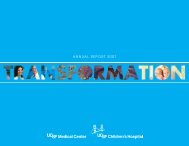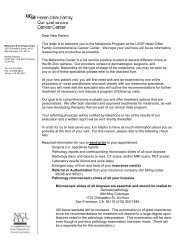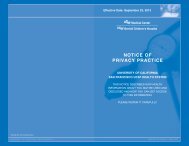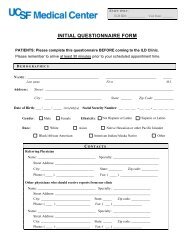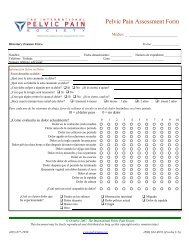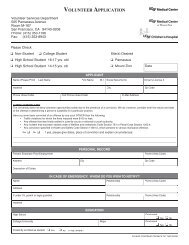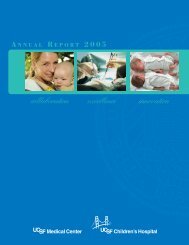c e n t e r n e w s l e t t e r - UCSF Medical Center
c e n t e r n e w s l e t t e r - UCSF Medical Center
c e n t e r n e w s l e t t e r - UCSF Medical Center
You also want an ePaper? Increase the reach of your titles
YUMPU automatically turns print PDFs into web optimized ePapers that Google loves.
Tools for Personalized Medicine Starting<br />
to Make Their Way to the Clinic<br />
Hope Rugo M,D, Elad Ziv MD, Laura Esserman MD and the Breast Care <strong>Center</strong> Faculty and Staff<br />
We want to let you know about new information that may be important to women who are taking or are thinking<br />
of taking tamoxifen to treat or prevent breast cancer. A new test is available that could provide additional<br />
information about the effectiveness of this treatment in a specific individual. If you are NOT taking or considering<br />
taking Tamoxifen, this will not apply to you, but you may find it interesting!<br />
INHERITED ENZYME VARIATIONS MAY AFFECT TAMOXIFEN’S EFFICACY<br />
Researchers have learned that the way a specific person processes drugs can make a difference in how effective a therapy is.<br />
We are beginning to shift our thinking away from a “one drug fits all” model to one that tailors therapies to an individual’s<br />
genetic makeup and environmental exposures.<br />
Pharmacogenomics is the term used to describe testing individuals’ DNA to determine if their particular genetic makeup<br />
will allow them to benefit from a specific drug. Many drugs are broken down or “metabolized” in the liver by the cytochrome<br />
P450 enzyme system. Tamoxifen is processed by a specific enzyme in this system called CYP2D6, which is<br />
inherited in several forms. A small number of women appear to inherit a variation of this enzyme that does not process<br />
Tamoxifen very well. Therefore, women with slow or poor processing of Tamoxifen may not receive as much benefit.<br />
Researchers are not sure how common this variant of the CYP2D6 enzyme is. Current estimates are that it may exist in<br />
5-7% of women; we do not know yet how common it is in other ethnic populations. More women need to be tested<br />
to learn specific information about how the enzyme variant affects different ethnic groups.<br />
SHOULD YOU BE TESTED FOR THE ENZYME VARIANT?<br />
We are holding information sessions about the possible value of being tested for the CYP2D6 variant. If<br />
you are taking Tamoxifen now, you would have the option of being tested for CYP2D6 after attending the<br />
session. Through a collaboration with Roche Diagnostics and Affimetrix, we will able to offer testing as<br />
part of a research study at <strong>UCSF</strong>.<br />
If you choose to get tested, the results of the test will be released to your physician. You and your breast cancer<br />
physician should discuss the results and determine what, if any, changes should be made to your treatment. For<br />
the vast majority of people, the test will show normal processing and no change in treatment will be necessary.<br />
IF and ONLY IF, you have the inactive variant of the enzyme, we will suggest that you meet with your treating<br />
physician to discuss the implications of the results on your treatment. We will also offer you the option of<br />
having your blood stored in a bank for future testing should studies show that this or other new tests could<br />
provide information about the best strategies for breast cancer treatment and prevention.<br />
ANTIDEPRESSANTS’ EFFECT ON TAMOXIFEN METABOLISM<br />
Some drugs also appear to interfere with or slow down the metabolism<br />
or processing of tamoxifen. In particular, the antidepressant drugs Paxil<br />
or Prozac appear to have this effect. If you are taking Tamoxifen and<br />
either Prozac or Paxil, please come to an educational session or call (415)<br />
353-7070 and make an appointment to see your oncologist or surgeon so<br />
we can discuss possible changes to your antidepressant treatment.<br />
WHAT SHOULD YOU DO?<br />
1. 1. If you are considering taking or are currently taking Tamoxifen, discuss this<br />
testing opportunity with your provider at your next appointment and consider<br />
attending one of the educational sessions listed below.<br />
2. If you would like to attend an educational session, please call the research<br />
coordinator, Wendy, at (415) 353-7921 to RSVP. If you leave a message,<br />
please leave your name and number, your doctor’s name and number, and<br />
which session you plan on attending.<br />
TAMOXIFEN<br />
AWARENESS<br />
EDUCATIONAL<br />
SESSIONS<br />
February 25, 6pm - 8pm<br />
February 27, 11am - 1pm<br />
March 3, 6pm - 8pm<br />
March 31, 6pm - 8pm<br />
All sessions will last about 2<br />
hours and will be in conference<br />
room H3805, third floor<br />
of the <strong>UCSF</strong> cancer center.<br />
BREAST CARE CENTER NEWSLETTER • SPRING 2008 • page 4


